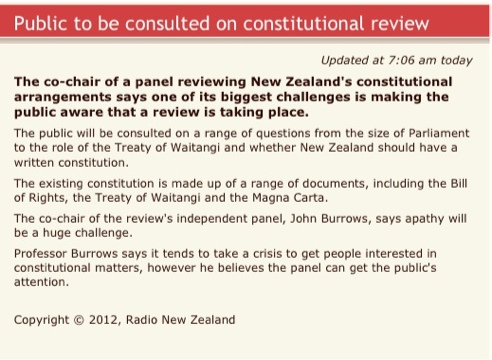Radio NZ News this Waitangi Day morning …
The co-chair of a panel reviewing New Zealand’s constitutional arrangements says one of its biggest challenges is making the public aware that a review is taking place.
The public will be consulted on a range of questions from the size of Parliament to the role of the Treaty of Waitangi and whether New Zealand should have a written constitution.
The existing constitution is made up of a range of documents, including the Bill of Rights, the Treaty of Waitangi and the Magna Carta.
The co-chair of the review’s independent panel, John Burrows, says apathy will be a huge challenge.
Professor Burrows says it tends to take a crisis to get people interested in constitutional matters, however he believes the panel can get the public’s attention.
What a statement! (it takes a crisis)
This is the constitutional review Winston Peters referred to in alarmist tones at his Kelston campaign speech last year. Personally, I think it’s a good idea to have a review, to korero and seek reconciliation.
Maintaining a position of ‘silence’ on important matters is infantile —akin to fingers in the ears ‘la-la-la-I-can’t-hear-you’.
These issues, our constitutional ‘arrangements’ are the test of our nationhood, and refusal to engage in the discussion/argument because you might ‘lose’,… or labeling those who disagree with you as greedy or corrupt ‘scum’ as some do, demonstrates immaturity greatly at odds with the great statesmen of our nation — Maori or Pakeha (or both).
History is written by the victors, some say, but injustice buried is never truly settled. Consider South Africa’s Truth and Reconciliation Commission and its mission.
Expose the truth, acknowledge past misdeeds, redress where possible … then we can ‘move on’.
– P



Tribalism (which provides no future for children) and Whakapapa (which discriminates in the basis of birth, including descent, family lineage, Whakapapa) would never stand up to serious intellectual scrutiny in the modern world (except for third-rate captured academics)so it is kept within elite circles.
Maori are just being used by far more powerful ‘tribal’ groupings in NZ and the world. So the difficulty that those who want a NZ constitution to be based on the Treaty of Waitangi is how to look as though it has the support of the people while keeping many important truths from them.
How many New Zealanders know about the human rights omissions in the NZ Bill of Rights Act 1990 especially given that according to the NZ human Rights Commission successive governments have refused to fund section 5(a) of the NZ Human Rights Act 1993 which requires the commission to educate people in human rights. How many NZers know that the omissions made were to create a ‘tribal New Zealand’.
If it was not for the Christchurch earthquakes NZ would be going precisely nowhere.And needless to say ordinary Maori are not being informed how the inclusion of the omitted rights would benefit them considerably as they would also Pakeha.
But what really exposes those who promote the treaty as the basis of a Constitution is that they fear serious intelligent debate – for instant, I have tried on a number of occasions (as I have gained some international credibility in human rights) but am ignored. Anthony Ravlich, Human Rights Council (NZ)
Speech from the throne 21 Dec 2011
http://www.beehive.govt.nz/speech/speech-throne-1
I suspect that the general perception of the Treaty of Waitangi is more fantasy and wishful thinking than reality.